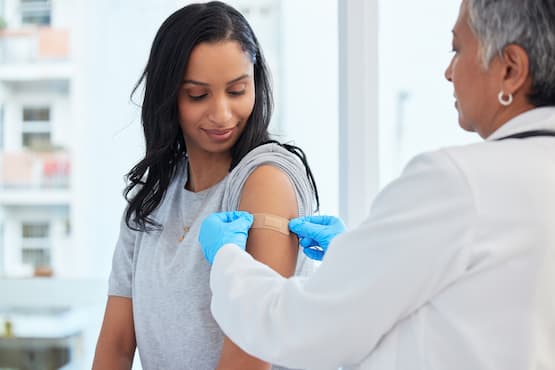Monash University Study Boosts Vaccine Efficacy by Stimulating ‘Bystander’ Immune Cells
Monash University researchers have developed a new technique to boost the effectiveness of both traditional and mRNA-based vaccines in animal models.
Published in Immunity, the study found that adding low doses of vaccine-specific antibody to a COVID-19 vaccine stimulated the immune system’s B cells, which are responsible for generating antibodies, to fight viral infections.
The results from this NHRMC-funded study highlight the potential of antibodies as vaccine components to boost the immune response.
“A key challenge for vaccine design is to ensure sufficient activation and duration of B cell responses to achieve the quantity and quality of antibodies required for protection,” said senior author Dr Isaak Quast, from Monash University’s Department of Immunology.
“Adding vaccine-specific antibodies is like adding a red flag, and making it really obvious to B cells that they need spring into action.
“This method stimulates B cells that would otherwise fail to be active participants in the immune response, potentially allowing new parts of invading viruses to be recognised, thus increasing protective immunity.”
Lead author Dr Alexandra Dvorscek said most vaccines offered specificity and strength, but it was often difficult to achieve breadth. “When you have viruses like influenza or SARS-CoV-2, which can vary significantly from year to year or even shorter time periods, and can cause significant harm, we need that broad-spectrum recognition and response,” Dr Dvorscek said.
One structure that is usually poorly recognised by the immune system is the conserved parts of viral proteins – the ‘essence’ of a virus that remains stable amid whatever new variants emerge as a virus evolves to evade immune detection.
Dr Dvorscek said like adjuvants, which enhance the immune system’s response to vaccination,
adding antibodies prolonged immune responses and unleashed more antibody production.
“The beauty of this technique is that, in collaboration with Dr Deborah Burnett and Jacqueline White from the Garvan Institute in Sydney, we showed that this works for both traditional and mRNA-based vaccines such as those targeting SARS-CoV-2,” she said.
“This obviously has implications for existing vaccines and those in development, that we can harness this technology to boost immune responses in a safe and highly targeted way.
“Beyond boosting B cell responses, antibodies influence which viral structures are targeted, and they make sure the immune system spreads its response across multiple parts of the pathogen. Our study provides novel insights into how this happens and how we may be able to use it to steer antibody production towards sites that need to be targeted for broad protective immunity.
“We have found a way to potentially use the immune system’s own method, antibodies, to influence how our body responds to a vaccine. This could be particularly relevant for people with poor responses to vaccines, such as the elderly or immunosuppressed. Future research will have to test that.”
Dr Quast said that while so far only tested in animal models, the research could also facilitate the development of vaccines to target structures of pathogens that are otherwise not recognised strongly enough by our immune system.
“In a diverse human population some people will always respond better than others, and this method could help ensure that a larger proportion of the population develops a ‘good, sufficient’ immune response for protection,” he said.
“The method in this paper has the potential to substantially increase such ordinarily poor responses, and it works with mRNA-based vaccines as well as traditional, and one example we use is to boost an mRNA SARS-CoV-2 vaccine developed by study co-author and Monash Institute of Pharmaceutical Sciences Professor Colin Pouton.”

